备考2011高效学习方案英语高二册:unit 4 a garden of poems
文档属性
| 名称 | 备考2011高效学习方案英语高二册:unit 4 a garden of poems | 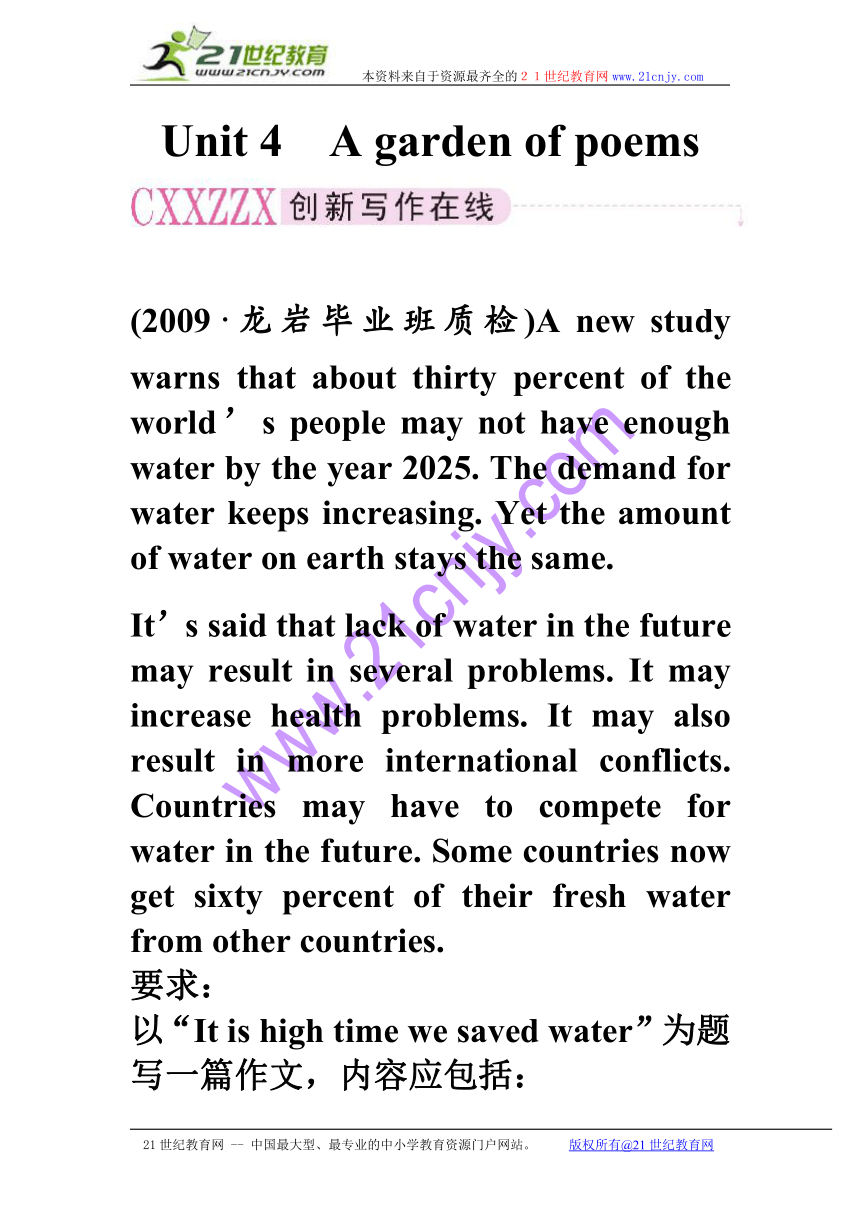 | |
| 格式 | rar | ||
| 文件大小 | 113.8KB | ||
| 资源类型 | 教案 | ||
| 版本资源 | 人教版 | ||
| 科目 | 英语 | ||
| 更新时间 | 2010-12-14 17:11:00 | ||
图片预览

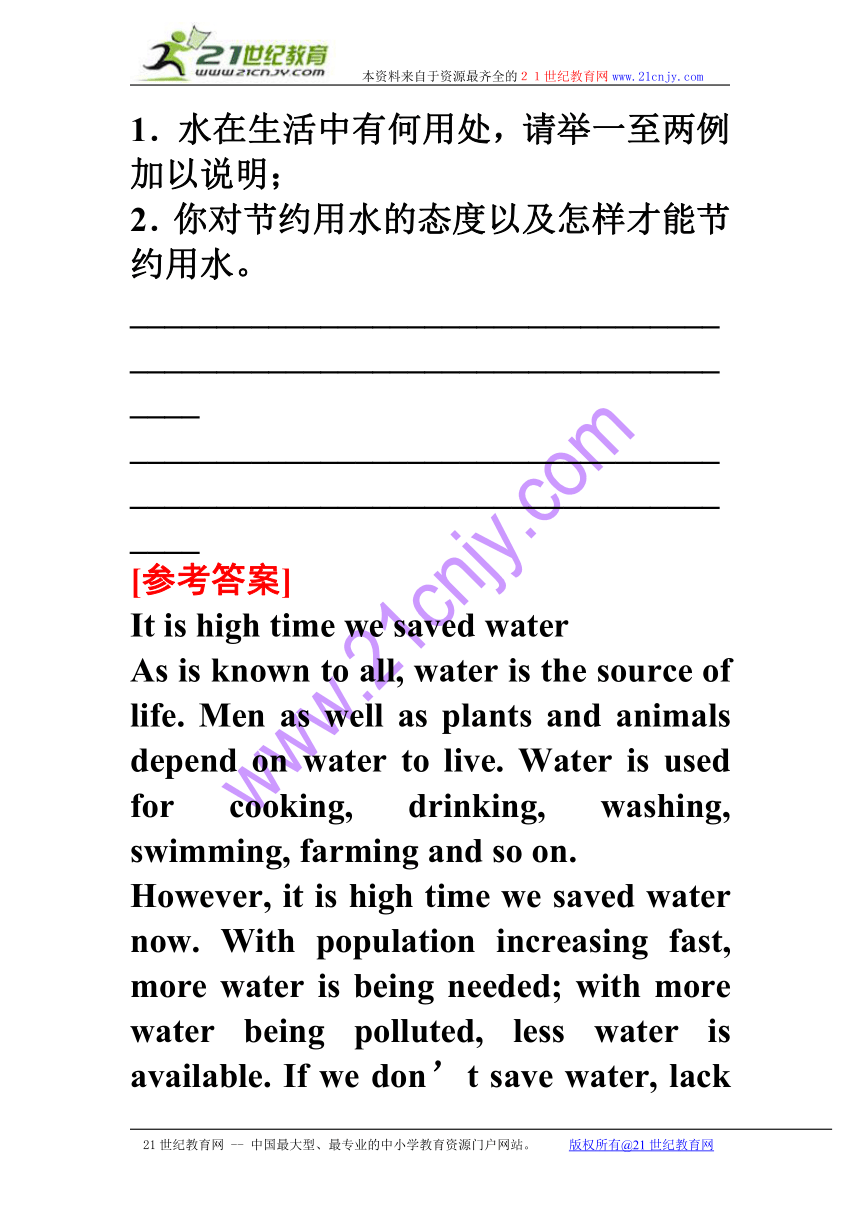
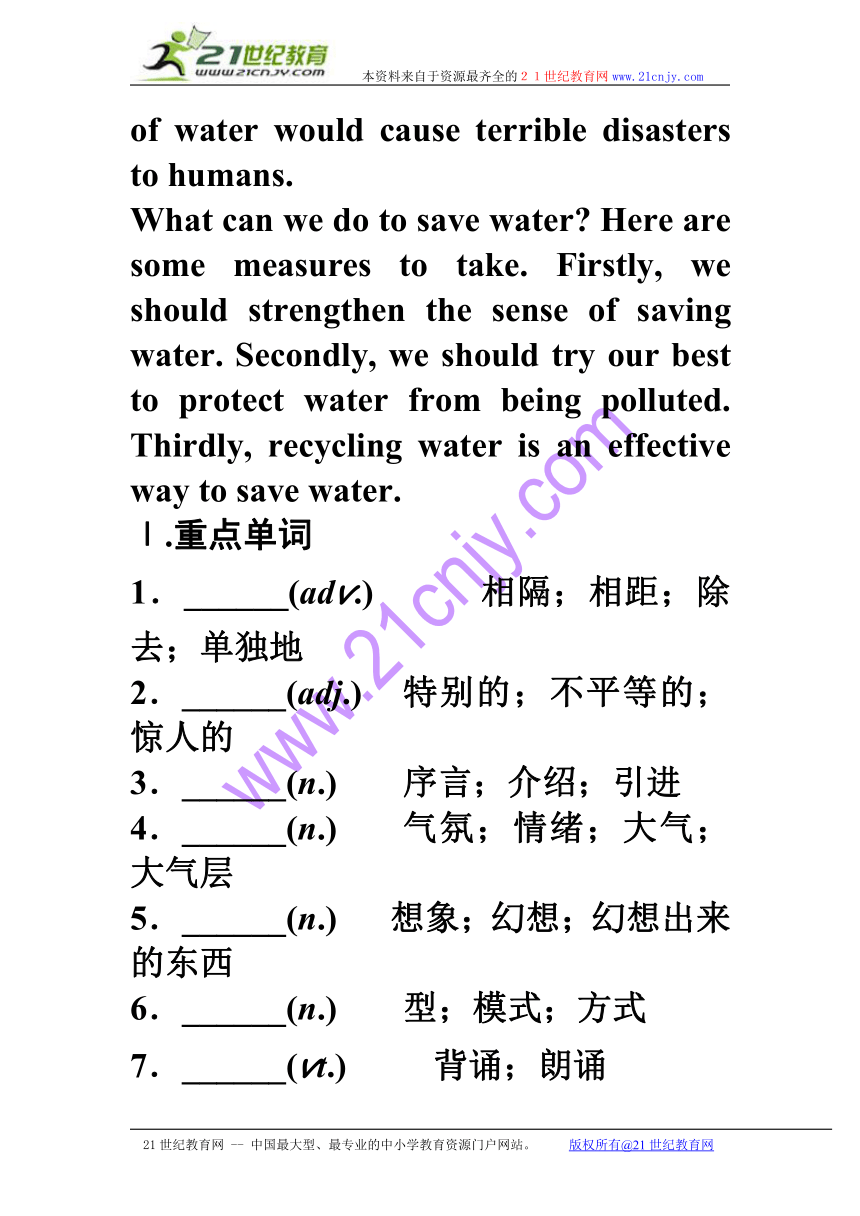
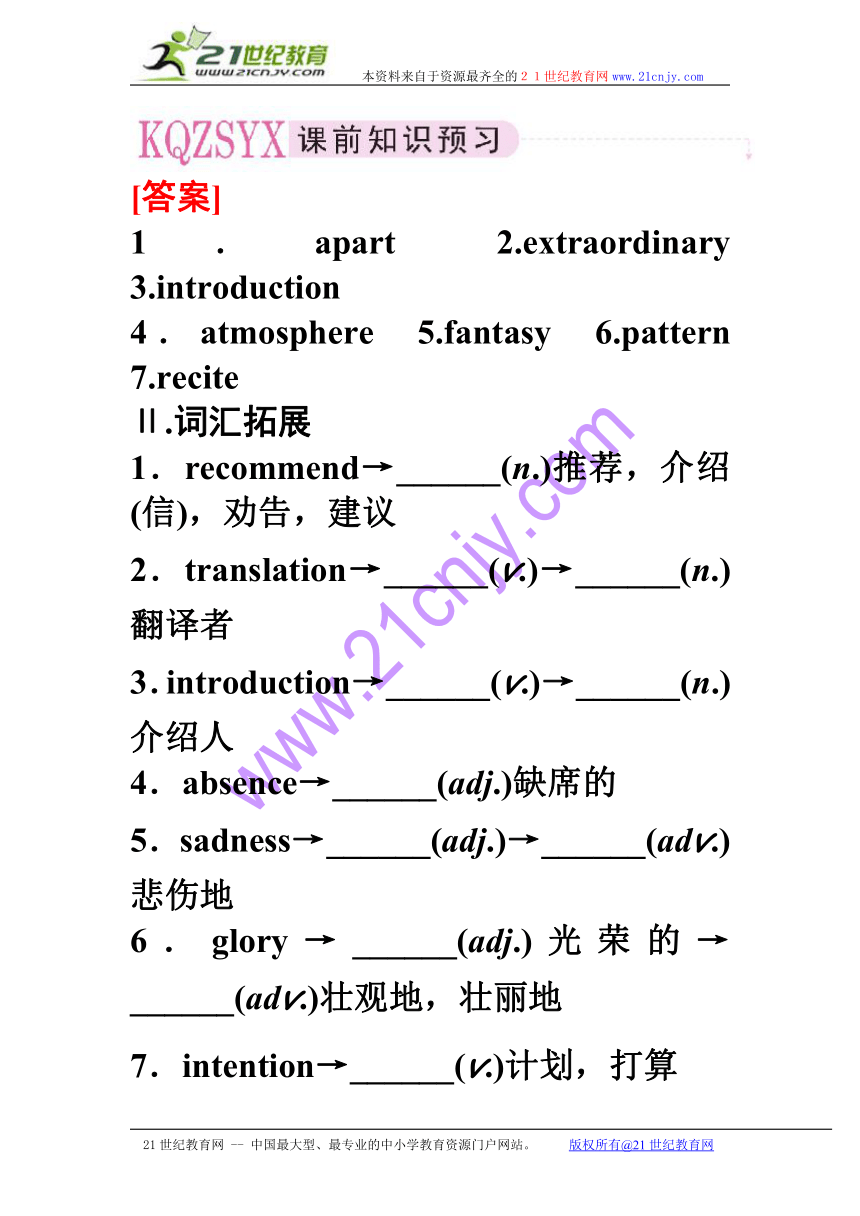
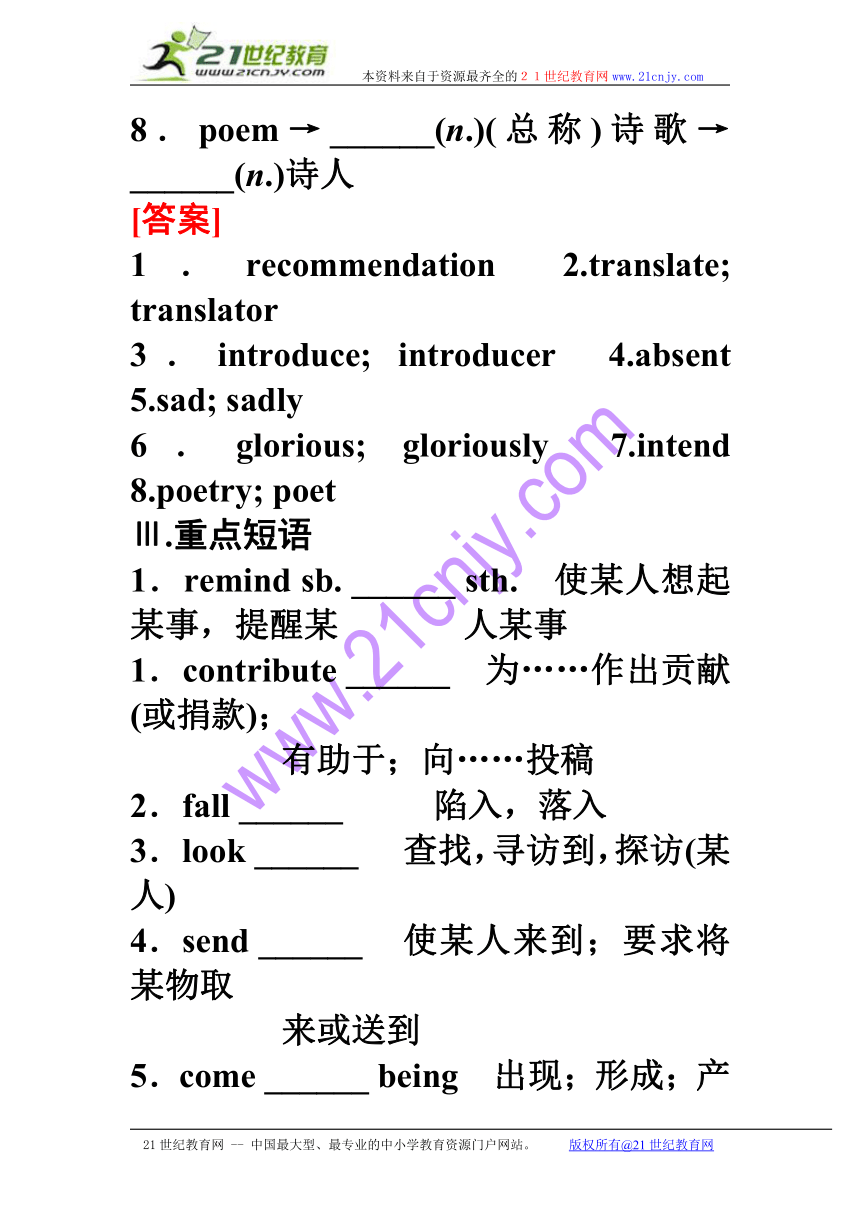
文档简介
本资料来自于资源最齐全的21世纪教育网www.21cnjy.com
Unit 4 A garden of poems
(2009·龙岩毕业班质检)A new study warns that about thirty percent of the world’s people may not have enough water by the year 2025. The demand for water keeps increasing. Yet the amount of water on earth stays the same.
It’s said that lack of water in the future may result in several problems. It may increase health problems. It may also result in more international conflicts. Countries may have to compete for water in the future. Some countries now get sixty percent of their fresh water from other countries.
要求:
以“It is high time we saved water”为题写一篇作文,内容应包括:
1.水在生活中有何用处,请举一至两例加以说明;
2.你对节约用水的态度以及怎样才能节约用水。
________________________________________________________________________
________________________________________________________________________
[参考答案]
It is high time we saved water
As is known to all, water is the source of life. Men as well as plants and animals depend on water to live. Water is used for cooking, drinking, washing, swimming, farming and so on.
However, it is high time we saved water now. With population increasing fast, more water is being needed; with more water being polluted, less water is available. If we don’t save water, lack of water would cause terrible disasters to humans.
What can we do to save water Here are some measures to take. Firstly, we should strengthen the sense of saving water. Secondly, we should try our best to protect water from being polluted. Thirdly, recycling water is an effective way to save water.
Ⅰ.重点单词
1.______(adv.) 相隔;相距;除去;单独地
2.______(adj.) 特别的;不平等的;惊人的
3.______(n.) 序言;介绍;引进
4.______(n.) 气氛;情绪;大气;大气层
5.______(n.) 想象;幻想;幻想出来的东西
6.______(n.) 型;模式;方式
7.______(vt.) 背诵;朗诵
[答案]
1.apart 2.extraordinary 3.introduction
4.atmosphere 5.fantasy 6.pattern 7.recite
Ⅱ.词汇拓展
1.recommend→______(n.)推荐,介绍(信),劝告,建议
2.translation→______(v.)→______(n.)翻译者
3.introduction→______(v.)→______(n.)介绍人
4.absence→______(adj.)缺席的
5.sadness→______(adj.)→______(adv.)悲伤地
6.glory→______(adj.)光荣的→______(adv.)壮观地,壮丽地
7.intention→______(v.)计划,打算
8.poem→______(n.)(总称)诗歌→______(n.)诗人
[答案]
1.recommendation 2.translate; translator
3.introduce; introducer 4.absent 5.sad; sadly
6.glorious; gloriously 7.intend 8.poetry; poet
Ⅲ.重点短语
1.remind sb. ______ sth. 使某人想起某事,提醒某 人某事
1.contribute ______ 为……作出贡献(或捐款);
有助于;向……投稿
2.fall ______ 陷入,落入
3.look ______ 查找,寻访到,探访(某人)
4.send ______ 使某人来到;要求将某物取
来或送到
5.come ______ being 出现;形成;产生
6.______ charge 主管,负责
7.______ the absence of 在……不在时
8.light ______ 照亮;使放光彩;点上(烟)等
吸起来
9.put...______ 把……结合成一整体;装配
10.stand ______ 突出;显眼;远远超过某人(物)
11.call ______ 召唤;使人想起;调动(力量、
人员等);提出(议案等);(给
……)打电话
12.play ______ 玩;玩耍;游戏
13.get ______ 通过,完成,度过,接通电话
[答案]
1.of 2.to 3.into 4.for 5.into 6.in 7.in
8.up 9.together 10.out 11.up 12.with
13.through
Ⅳ.重点句型
1.Once published, his work became famous for the absence of rhyme at the end of each line.
他的作品一出版就因为在每一行诗的结尾没有韵脚而闻名。
2.Greatly loved in China are the English Romantic poets.
英国浪漫主义诗人深受中国人的喜爱。
3....no matter how well a poem is translated, something of the spirit of the original work is lost.
……无论一首诗翻译得多好,原作中的某些精神实质性的东西还是会失去。
Ⅴ.重点语法
The Past Participle Used as Adverbial(过去分词作状语)
Ⅰ.词汇聚焦
1.recommend vt. 推荐,介绍;劝告,建议
[思维拓展]
recommend sb...=recommend...to sb.
向某人推荐/介绍……
recommend sb. for...推荐某人做(某职位)
recommend sth. for...推荐某物作某种用途
recommend sb. as...推荐某人为……
recommend doing...建议做……
recommend sb. to do sth.建议某人做某事
recommend+that...建议……(that从句中用should+动词原形,should可省略)
recommendation n. 推荐,介绍信
①Can you recommend me a good dentist
②He recommended that we (should) read the novel.
③I recommended you to follow your doctor’s advice.
2.besides adv.
[思维拓展]
besides adv. 此外,另外;相当于also, what’s more。
besides prep.除……之外,还有……
beside prep. 在……旁边
①I don’t like these shoes; besides, they’re too expensive.
②Besides advice, he gave her money.
③Come and sit beside me.
It’s really too late to go for a walk now. ______, it’s going to rain.
A. Besides B. However
C. Anyway D. Otherwise
解析:besides adv. “而且”,在此表示另一个不出去散步的理由,“要下雨了”。
答案:A
3.experience v. 经历,感受;[U]n. 经验;[C]n. 经历,阅历
[思维拓展]
experience...as感到……是……
learn from/by/through experience
通过经验学习
two years’ experience in teaching
两年的教学经验
an experienced doctor
一位经验丰富的医生
be experienced in/at (doing) sth.
在某些方面/对于某事有经验
①He experienced a strong feeling of sadness.
②It was the first time that he had experienced the sense of beauty.
This is a man of ______ and he had ______ interesting ______ in his life.
A. much experience; a lot of; experiences
B. many experiences; much; experience
C. many experiences; much; experiences
D. much experience; a lot of; experience
解析:much修饰不可数名词,故排除C项;作“经验”讲时,experience是不可数名词,“经历”是可数名词,由句意可知“他一生中有许多有趣的经历”。
答案:A
Ⅱ.短语突破
1.more than超过
[思维拓展]
①more than=over超过(less than不足)
②more than不仅仅
③more...than...与其说是……,不如说是……
④no more than+数词/a(n)仅仅 (=only)(强调少)
⑤no more...than...
与……一样都不……(两者皆否定)
⑥not more than+数词=at most至多,不超过(less than)(不强调少,不带感彩)
⑦not more...than...不如……(前者不如后者)
[指点迷津]
“more than+从句”时常具有否定意义,可译为“并非,不是”。
①He ate no more than a slice of toast for breakfast.
②Tom is no more diligent than Jack.
③There were not more than 8 women in the store then.
How disappointing! They have finished ______ 5% of the work.
A. no more than B. no less than
C. more than D. not less than
解析:no more than“仅仅”,no less than“不少于”, more than“超过”, not less than“至少”,根据“How disappointing!”可知任务完成太少。
答案:A
2.get through
[思维拓展]
get through的用法归纳:
①通过,穿过②使(议案等)通过
③考试及格④接通或打通电话
⑤抵达目的地⑥经过……后仍然活着
⑦完成,结束⑧用完,花光
All of them got through, that is to say, they all passed the exam.
[指点迷津]
get/put sb. through to给某人接通到
go through通过,经历,搜遍
pass through从……中经过,走过……
look through浏览;仔细查看
live through活过(一段时间),经过……后仍活着
break through突破(障碍)
Most people can’t ______ the day without at least one cup of tea or coffee.
A. get at B. get on
C. get by D. get through
解析:此题考查了动词短语的辨析。get at“到达;了解,掌握;意指等”;get on“上车;过活”;get by“通过;走过”;get through“到达;通过”。句子的意思是:大部分人没有一杯茶或咖啡就不可能度过这一天。
答案:D
3.send for派人去请
[思维拓展]
send out发送(通知、请柬等);发出(光、热、声音等)
send away解雇;打发……走
send up发射
send sb. doing使……(迅速)做……
send sb. mad使得某人发疯
①The sun sends out light and heat.
②He sent his son away to school in Japan.
He ______ the children so that the house might be quiet, because they were too noisy.
A. sent up B. sent for
C. gave out D. sent away
解析:句意为“他把孩子打发走了为了家中安静”,send away“把……打发走”。A项“发射”,B项“派人去请”,C项“分发;发出”,均不合题意。
答案:D
4.call up召唤;使人想起;召集、调动(力量、人员等);提出(议案等);打电话给……
[思维拓展]
call on访问,探望(某人)
call at访问(某地)
call for需要,提倡,邀约,去取
call back叫回;回电话
call round来访,逗留;叫(出租车等)
call off喊走,取消(交易、比赛等)
Your letter ______ the days when we worked together in the countryside 20 years ago.
A. calls up B. calls on
C. calls for D. calls back
解析:根据句意“你的来信使我想起了20年前我们一起在农村工作的日子”。A项可以表示“使人想起”;B项表示“访问,探望”;C项表示“提倡,邀约”;D项表示“叫回,回电话”。
答案:A
5.all the same都一样,无关紧要;尽管如此,虽然,然而(相当于副词短语)
[思维拓展]
just the same(=all the same)同样地,照样
be the same with sb./sth.(某人/某物)也一样
Same to you!(=The same to you!)祝你也如此!(通常用于回答对方的祝福语)
Thank you all the same.尽管如此,还是要谢谢你。(通常用于对方没能满足你的要求或没能帮助你而表示道谢的答语)
—When shall we meet again
—Make it ______ day you like; it’s all the same to me.
A. one B. any
C. another D. some
解析:make it“规定时间”,本题尽管考查的是代词,但答题的关键却是最后一句话it’s all the same to me.“对我来说哪一天都一样”。由此看来,本题表示“你可以定在你喜欢的任何一天”,要用any, any用于肯定句,表示“任何一个”。
答案:B
Ⅲ.句型归纳
1.Once published, his work became famous for the absence of rhyme at the end of each line.他的作品一出版就出了名,因为诗的每一行的末尾都不押韵。
Once published为Once his work was published的省略。在英语中,当状语从句中的主语与主句的主语一致或从句的主语为it,同时从句谓语又含有系动词be时,可将从句的主语和系动词be一同省略,留下其余部分。
[思维拓展]
all at once (=suddenly)突然
once in a while偶尔
once or twice数次,几次,一两次
once upon a time从前
once a week/month/year每周/月/年一次
once and for all最后一次,一劳永逸地
for once就这一回,仅此一次
once in a blue moon (口)非常高兴,十分愉快
[指点迷津]
once conj.“一旦……就……”,引导时间状语从句,主句用将来时,once从句用一般时代替将来时。as soon as“一旦……就”,引导时间状语从句,用法同once。但as soon as强调动作的紧接,而once从句具有条件的意味。
①Don’t talk while (you are) eating.
②I won’t go even if (I’m) invited.
③Go to him for help when (it is) necessary.
The research is so designed that once ______ nothing can be done to change it.
A. begins B. having begun
C. beginning D. begun
解析:该题考查省略句的用法。题干中so...that引导一个结果状语从句,在that后的结果状语从句中又含有一个once引导的时间状语从句,意为“一旦……就……”。此空应填begun,从句为省略句,省略了it和is,完整的句子应为once it is begun。
答案:D
2.Why read, and sometimes even write poetry 为什么读,有时甚至写诗呢?
why (not) do sth.是一个很常见的句型。肯定形式有时还含有责备的意味,否定形式则常用来表示建议。
[思维拓展]
why do...?=why do you do...?/why do people do...
why not do...?=why don’t you do...
why not?可表示“为什么不?为什么不行?”或“当然,好啊”等意。
①—You shouldn’t go out with him.
—Why not
②—Let’s go to the theatre.
—Why not
—I usually go there by train.
—Why not ______ by boat for a change
A. to try going B. try to go
C. to try and go D. try going
解析:“Why not do...?”表示建议,故排除A、C两项,try doing是“尝试一下做某事”;try to do sth.是“努力做某事”。
答案:D
3.Besides, no matter how well a poem is translated, something of the spirit of the original work is lost.而且,不管诗被翻译得有多好,也会失去原著的某些精髓。
no matter how引导让步状语从句,意为“不管/无论多么/怎么”。如:
No matter what you said, I don’t believe you.
No matter who he is, it is wrong of him to do that.
no matter引导让步状语从句,必须在后面接how, what, when, where, which, who等词;有时no matter位于句末,省略某些与主句主语或宾语关系密切的成分。如:
No matter how hard you try, you’ll never lose your English accent.
You must return the book to us no matter when.
I wanted to see Jack before he left, but it is no matter.
______ you ask for will be given to you.
A. Whatever B. No matter what
C. That D. Which
解析:分析题干结构可知,空格处应引导主语从句,可排除B项;因所填选项在从句中作宾语,可排除C项;又因此处无选择意义,所以D项不可。
答案:A
21世纪教育网 -- 中国最大型、最专业的中小学教育资源门户网站。 版权所有@21世纪教育网
Unit 4 A garden of poems
(2009·龙岩毕业班质检)A new study warns that about thirty percent of the world’s people may not have enough water by the year 2025. The demand for water keeps increasing. Yet the amount of water on earth stays the same.
It’s said that lack of water in the future may result in several problems. It may increase health problems. It may also result in more international conflicts. Countries may have to compete for water in the future. Some countries now get sixty percent of their fresh water from other countries.
要求:
以“It is high time we saved water”为题写一篇作文,内容应包括:
1.水在生活中有何用处,请举一至两例加以说明;
2.你对节约用水的态度以及怎样才能节约用水。
________________________________________________________________________
________________________________________________________________________
[参考答案]
It is high time we saved water
As is known to all, water is the source of life. Men as well as plants and animals depend on water to live. Water is used for cooking, drinking, washing, swimming, farming and so on.
However, it is high time we saved water now. With population increasing fast, more water is being needed; with more water being polluted, less water is available. If we don’t save water, lack of water would cause terrible disasters to humans.
What can we do to save water Here are some measures to take. Firstly, we should strengthen the sense of saving water. Secondly, we should try our best to protect water from being polluted. Thirdly, recycling water is an effective way to save water.
Ⅰ.重点单词
1.______(adv.) 相隔;相距;除去;单独地
2.______(adj.) 特别的;不平等的;惊人的
3.______(n.) 序言;介绍;引进
4.______(n.) 气氛;情绪;大气;大气层
5.______(n.) 想象;幻想;幻想出来的东西
6.______(n.) 型;模式;方式
7.______(vt.) 背诵;朗诵
[答案]
1.apart 2.extraordinary 3.introduction
4.atmosphere 5.fantasy 6.pattern 7.recite
Ⅱ.词汇拓展
1.recommend→______(n.)推荐,介绍(信),劝告,建议
2.translation→______(v.)→______(n.)翻译者
3.introduction→______(v.)→______(n.)介绍人
4.absence→______(adj.)缺席的
5.sadness→______(adj.)→______(adv.)悲伤地
6.glory→______(adj.)光荣的→______(adv.)壮观地,壮丽地
7.intention→______(v.)计划,打算
8.poem→______(n.)(总称)诗歌→______(n.)诗人
[答案]
1.recommendation 2.translate; translator
3.introduce; introducer 4.absent 5.sad; sadly
6.glorious; gloriously 7.intend 8.poetry; poet
Ⅲ.重点短语
1.remind sb. ______ sth. 使某人想起某事,提醒某 人某事
1.contribute ______ 为……作出贡献(或捐款);
有助于;向……投稿
2.fall ______ 陷入,落入
3.look ______ 查找,寻访到,探访(某人)
4.send ______ 使某人来到;要求将某物取
来或送到
5.come ______ being 出现;形成;产生
6.______ charge 主管,负责
7.______ the absence of 在……不在时
8.light ______ 照亮;使放光彩;点上(烟)等
吸起来
9.put...______ 把……结合成一整体;装配
10.stand ______ 突出;显眼;远远超过某人(物)
11.call ______ 召唤;使人想起;调动(力量、
人员等);提出(议案等);(给
……)打电话
12.play ______ 玩;玩耍;游戏
13.get ______ 通过,完成,度过,接通电话
[答案]
1.of 2.to 3.into 4.for 5.into 6.in 7.in
8.up 9.together 10.out 11.up 12.with
13.through
Ⅳ.重点句型
1.Once published, his work became famous for the absence of rhyme at the end of each line.
他的作品一出版就因为在每一行诗的结尾没有韵脚而闻名。
2.Greatly loved in China are the English Romantic poets.
英国浪漫主义诗人深受中国人的喜爱。
3....no matter how well a poem is translated, something of the spirit of the original work is lost.
……无论一首诗翻译得多好,原作中的某些精神实质性的东西还是会失去。
Ⅴ.重点语法
The Past Participle Used as Adverbial(过去分词作状语)
Ⅰ.词汇聚焦
1.recommend vt. 推荐,介绍;劝告,建议
[思维拓展]
recommend sb...=recommend...to sb.
向某人推荐/介绍……
recommend sb. for...推荐某人做(某职位)
recommend sth. for...推荐某物作某种用途
recommend sb. as...推荐某人为……
recommend doing...建议做……
recommend sb. to do sth.建议某人做某事
recommend+that...建议……(that从句中用should+动词原形,should可省略)
recommendation n. 推荐,介绍信
①Can you recommend me a good dentist
②He recommended that we (should) read the novel.
③I recommended you to follow your doctor’s advice.
2.besides adv.
[思维拓展]
besides adv. 此外,另外;相当于also, what’s more。
besides prep.除……之外,还有……
beside prep. 在……旁边
①I don’t like these shoes; besides, they’re too expensive.
②Besides advice, he gave her money.
③Come and sit beside me.
It’s really too late to go for a walk now. ______, it’s going to rain.
A. Besides B. However
C. Anyway D. Otherwise
解析:besides adv. “而且”,在此表示另一个不出去散步的理由,“要下雨了”。
答案:A
3.experience v. 经历,感受;[U]n. 经验;[C]n. 经历,阅历
[思维拓展]
experience...as感到……是……
learn from/by/through experience
通过经验学习
two years’ experience in teaching
两年的教学经验
an experienced doctor
一位经验丰富的医生
be experienced in/at (doing) sth.
在某些方面/对于某事有经验
①He experienced a strong feeling of sadness.
②It was the first time that he had experienced the sense of beauty.
This is a man of ______ and he had ______ interesting ______ in his life.
A. much experience; a lot of; experiences
B. many experiences; much; experience
C. many experiences; much; experiences
D. much experience; a lot of; experience
解析:much修饰不可数名词,故排除C项;作“经验”讲时,experience是不可数名词,“经历”是可数名词,由句意可知“他一生中有许多有趣的经历”。
答案:A
Ⅱ.短语突破
1.more than超过
[思维拓展]
①more than=over超过(less than不足)
②more than不仅仅
③more...than...与其说是……,不如说是……
④no more than+数词/a(n)仅仅 (=only)(强调少)
⑤no more...than...
与……一样都不……(两者皆否定)
⑥not more than+数词=at most至多,不超过(less than)(不强调少,不带感彩)
⑦not more...than...不如……(前者不如后者)
[指点迷津]
“more than+从句”时常具有否定意义,可译为“并非,不是”。
①He ate no more than a slice of toast for breakfast.
②Tom is no more diligent than Jack.
③There were not more than 8 women in the store then.
How disappointing! They have finished ______ 5% of the work.
A. no more than B. no less than
C. more than D. not less than
解析:no more than“仅仅”,no less than“不少于”, more than“超过”, not less than“至少”,根据“How disappointing!”可知任务完成太少。
答案:A
2.get through
[思维拓展]
get through的用法归纳:
①通过,穿过②使(议案等)通过
③考试及格④接通或打通电话
⑤抵达目的地⑥经过……后仍然活着
⑦完成,结束⑧用完,花光
All of them got through, that is to say, they all passed the exam.
[指点迷津]
get/put sb. through to给某人接通到
go through通过,经历,搜遍
pass through从……中经过,走过……
look through浏览;仔细查看
live through活过(一段时间),经过……后仍活着
break through突破(障碍)
Most people can’t ______ the day without at least one cup of tea or coffee.
A. get at B. get on
C. get by D. get through
解析:此题考查了动词短语的辨析。get at“到达;了解,掌握;意指等”;get on“上车;过活”;get by“通过;走过”;get through“到达;通过”。句子的意思是:大部分人没有一杯茶或咖啡就不可能度过这一天。
答案:D
3.send for派人去请
[思维拓展]
send out发送(通知、请柬等);发出(光、热、声音等)
send away解雇;打发……走
send up发射
send sb. doing使……(迅速)做……
send sb. mad使得某人发疯
①The sun sends out light and heat.
②He sent his son away to school in Japan.
He ______ the children so that the house might be quiet, because they were too noisy.
A. sent up B. sent for
C. gave out D. sent away
解析:句意为“他把孩子打发走了为了家中安静”,send away“把……打发走”。A项“发射”,B项“派人去请”,C项“分发;发出”,均不合题意。
答案:D
4.call up召唤;使人想起;召集、调动(力量、人员等);提出(议案等);打电话给……
[思维拓展]
call on访问,探望(某人)
call at访问(某地)
call for需要,提倡,邀约,去取
call back叫回;回电话
call round来访,逗留;叫(出租车等)
call off喊走,取消(交易、比赛等)
Your letter ______ the days when we worked together in the countryside 20 years ago.
A. calls up B. calls on
C. calls for D. calls back
解析:根据句意“你的来信使我想起了20年前我们一起在农村工作的日子”。A项可以表示“使人想起”;B项表示“访问,探望”;C项表示“提倡,邀约”;D项表示“叫回,回电话”。
答案:A
5.all the same都一样,无关紧要;尽管如此,虽然,然而(相当于副词短语)
[思维拓展]
just the same(=all the same)同样地,照样
be the same with sb./sth.(某人/某物)也一样
Same to you!(=The same to you!)祝你也如此!(通常用于回答对方的祝福语)
Thank you all the same.尽管如此,还是要谢谢你。(通常用于对方没能满足你的要求或没能帮助你而表示道谢的答语)
—When shall we meet again
—Make it ______ day you like; it’s all the same to me.
A. one B. any
C. another D. some
解析:make it“规定时间”,本题尽管考查的是代词,但答题的关键却是最后一句话it’s all the same to me.“对我来说哪一天都一样”。由此看来,本题表示“你可以定在你喜欢的任何一天”,要用any, any用于肯定句,表示“任何一个”。
答案:B
Ⅲ.句型归纳
1.Once published, his work became famous for the absence of rhyme at the end of each line.他的作品一出版就出了名,因为诗的每一行的末尾都不押韵。
Once published为Once his work was published的省略。在英语中,当状语从句中的主语与主句的主语一致或从句的主语为it,同时从句谓语又含有系动词be时,可将从句的主语和系动词be一同省略,留下其余部分。
[思维拓展]
all at once (=suddenly)突然
once in a while偶尔
once or twice数次,几次,一两次
once upon a time从前
once a week/month/year每周/月/年一次
once and for all最后一次,一劳永逸地
for once就这一回,仅此一次
once in a blue moon (口)非常高兴,十分愉快
[指点迷津]
once conj.“一旦……就……”,引导时间状语从句,主句用将来时,once从句用一般时代替将来时。as soon as“一旦……就”,引导时间状语从句,用法同once。但as soon as强调动作的紧接,而once从句具有条件的意味。
①Don’t talk while (you are) eating.
②I won’t go even if (I’m) invited.
③Go to him for help when (it is) necessary.
The research is so designed that once ______ nothing can be done to change it.
A. begins B. having begun
C. beginning D. begun
解析:该题考查省略句的用法。题干中so...that引导一个结果状语从句,在that后的结果状语从句中又含有一个once引导的时间状语从句,意为“一旦……就……”。此空应填begun,从句为省略句,省略了it和is,完整的句子应为once it is begun。
答案:D
2.Why read, and sometimes even write poetry 为什么读,有时甚至写诗呢?
why (not) do sth.是一个很常见的句型。肯定形式有时还含有责备的意味,否定形式则常用来表示建议。
[思维拓展]
why do...?=why do you do...?/why do people do...
why not do...?=why don’t you do...
why not?可表示“为什么不?为什么不行?”或“当然,好啊”等意。
①—You shouldn’t go out with him.
—Why not
②—Let’s go to the theatre.
—Why not
—I usually go there by train.
—Why not ______ by boat for a change
A. to try going B. try to go
C. to try and go D. try going
解析:“Why not do...?”表示建议,故排除A、C两项,try doing是“尝试一下做某事”;try to do sth.是“努力做某事”。
答案:D
3.Besides, no matter how well a poem is translated, something of the spirit of the original work is lost.而且,不管诗被翻译得有多好,也会失去原著的某些精髓。
no matter how引导让步状语从句,意为“不管/无论多么/怎么”。如:
No matter what you said, I don’t believe you.
No matter who he is, it is wrong of him to do that.
no matter引导让步状语从句,必须在后面接how, what, when, where, which, who等词;有时no matter位于句末,省略某些与主句主语或宾语关系密切的成分。如:
No matter how hard you try, you’ll never lose your English accent.
You must return the book to us no matter when.
I wanted to see Jack before he left, but it is no matter.
______ you ask for will be given to you.
A. Whatever B. No matter what
C. That D. Which
解析:分析题干结构可知,空格处应引导主语从句,可排除B项;因所填选项在从句中作宾语,可排除C项;又因此处无选择意义,所以D项不可。
答案:A
21世纪教育网 -- 中国最大型、最专业的中小学教育资源门户网站。 版权所有@21世纪教育网
同课章节目录
